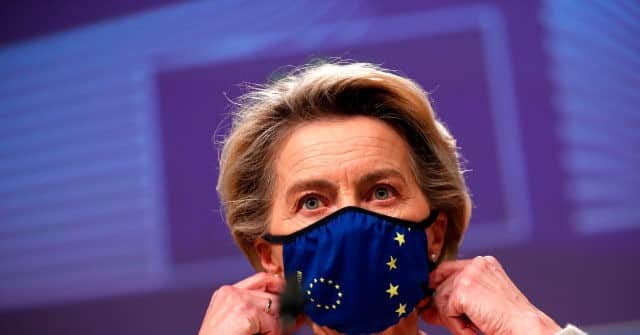Brexit leader Nigel Farage has criticised the “nasty, vindictive” EU for threatening to block the export of vaccines purchased by Britain because Brussels is falling behind in its own vaccine programme.
Earlier this week, both Pfizer and AstraZeneca announced delays to the delivery of their Belgian-made coronavirus vaccines to its EU customers due to manufacturing problems. In response, the bloc’s health commissioner Stella Kyriakides said that Brussels might use its powers to ban the export of vaccinations to non-EU countries such as the United Kingdom, even if the pharmaceutical company has signed a contract with that nation.
The next day, European Commission President Ursula von der Leyen said from the World Economic Forum at Davos that the EU “will set up a vaccine export… transparency mechanism”.
In response, UK Health Minister Matt Hancock accused the EU of “protectionism and narrow nationalism”, according to The Telegraph. EU diplomats also made the audacious claim that AstraZeneca vaccines meant for the EU ended up in the UK.
The head of AstraZeneca Pascal Soroit implied in an interview with La Repubblica that the EU was getting “aggravated” and “emotional”, but denied it had sent any vaccines destined for the bloc to the United Kingdom.
With the UK free of the EU’s European Medicines Agency, the country was able to directly secure contracts with drugs companies for a vaccine some three months before the EU. Several EU member-states, including France and Italy, had made their own agreements with drugs companies as long ago as June. However, due to Brussels’ demand that only the EU can negotiate with drugs companies, the member-states had to wait until the end of August for a Europe-wide deal to be made.
“Frankly, it seems like a rather childish and spiteful way to behave. This looks awfully like blackmail, which is pretty disreputable and shows why we were right to leave the EU.” https://t.co/gk9sSxJuLk
— Breitbart London (@BreitbartLondon) January 26, 2021
While the British government approved the AstraZeneca-Oxford vaccine on December 30th — the second, after the Pfizer shot was authorised for use on December 2nd — the EU is only predicted to approve the AstraZeneca product at the end of this week. The EU authorised the use of the Pfizer jab on December 21st, nearly three weeks after the UK.
So far, Britain has vaccinated 10 per cent of the population, and is believed to be on track to inoculate the most vulnerable by mid-February. The EU has managed to safeguard just two per cent of its population with the jabs.
Mr Soriot told the Italian newspaper that while he would not “pass judgement” on the EU for signing its contracts so late, he said that the company had been working with the UK government on the vaccines for some time and therefore had a “head start”. Because of this, the British factories have the highest yields, while “the sites that have the lowest productivity in the network are the sites that are supplying Europe”.
“By March, the UK will have vaccinated maybe 28 or 30 million people. The Prime Minister has a goal to vaccinate 15 million people by mid-February, and they’re already at 6.5 million. So they will get there,” the AstraZeneca CEO predicted.
A pro-EU source at the drugs company admitted to journalist Robert Peston that he could “understand Brexit better now”, following the protracted dealings with the bloc.
“We will not accept that the United Kingdom will be the only country in the world that doesn’t recognise the delegation of the European Union the equivalent of a diplomatic mission.” https://t.co/xATT1OG0q9
— Breitbart London (@BreitbartLondon) January 26, 2021
Reform UK leader Farage remarked that the situation unfolding in the bloc was evidence that “Brexit was the right thing to do”.
Condemning the remarks of EU Health Commissioner Kyriakides, Mr Farage said: “All of this tells us everything we need to know about the European Union: nasty, vindictive, and very nationalistic.”
He said that in order to cover up “their own incompetence”, the bloc was willing to “punish” the United Kingdom. He added that Brussels is “scared” that the message Brexit Britain’s handling of vaccinations will send to other EU member states is that the bloc has failed to look after its people, caring only to maintain “the political project that is called the European Union”.
Mr Farage concluded: “It is a bad project run by bad people. It is not in the interests of anyone living in those European countries, and I genuinely hope and believe that Brexit is the first step to the beginning of the end of this Brussels nightmare. People need decisions made for them, that directly affect their lives, by those they vote for and those they can remove.”
“It is crushing democracy, it is delivering terrible economic outcomes — particularly for those countries in the Mediterranean — and it’s about time we started to link arms with other countries around Europe so that they can get back their independence, their liberty. Provided we have a Europe of democratic states, we will always have a Europe of peace,” he said.
If Europe’s vaccine crisis on the continent has taught us anything, it is that the best decisions are taken by national governments acting in their own interest.
— Nigel Farage (@Nigel_Farage) January 26, 2021



